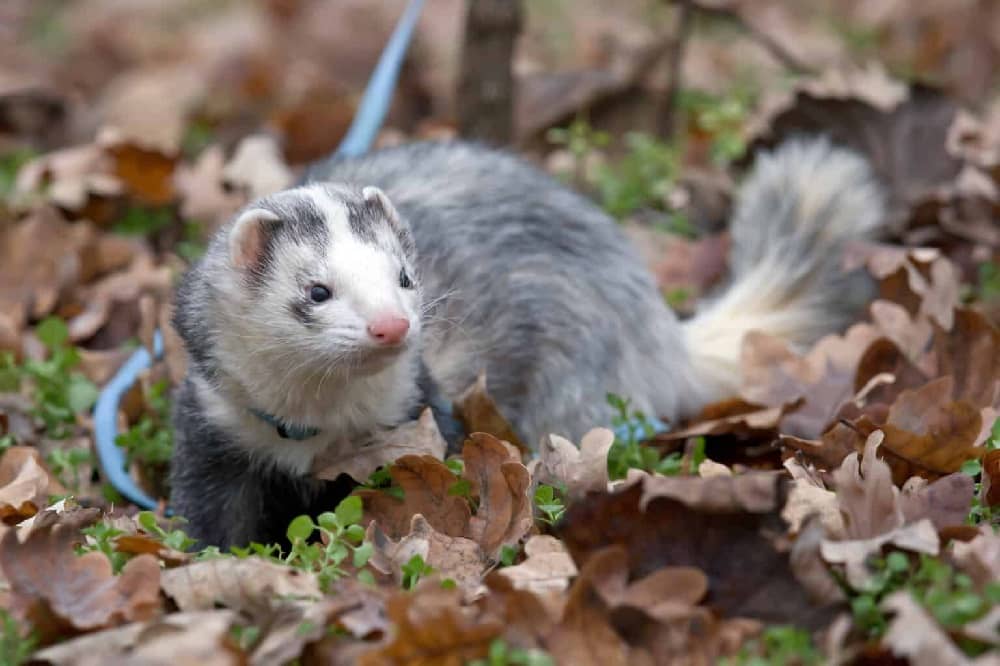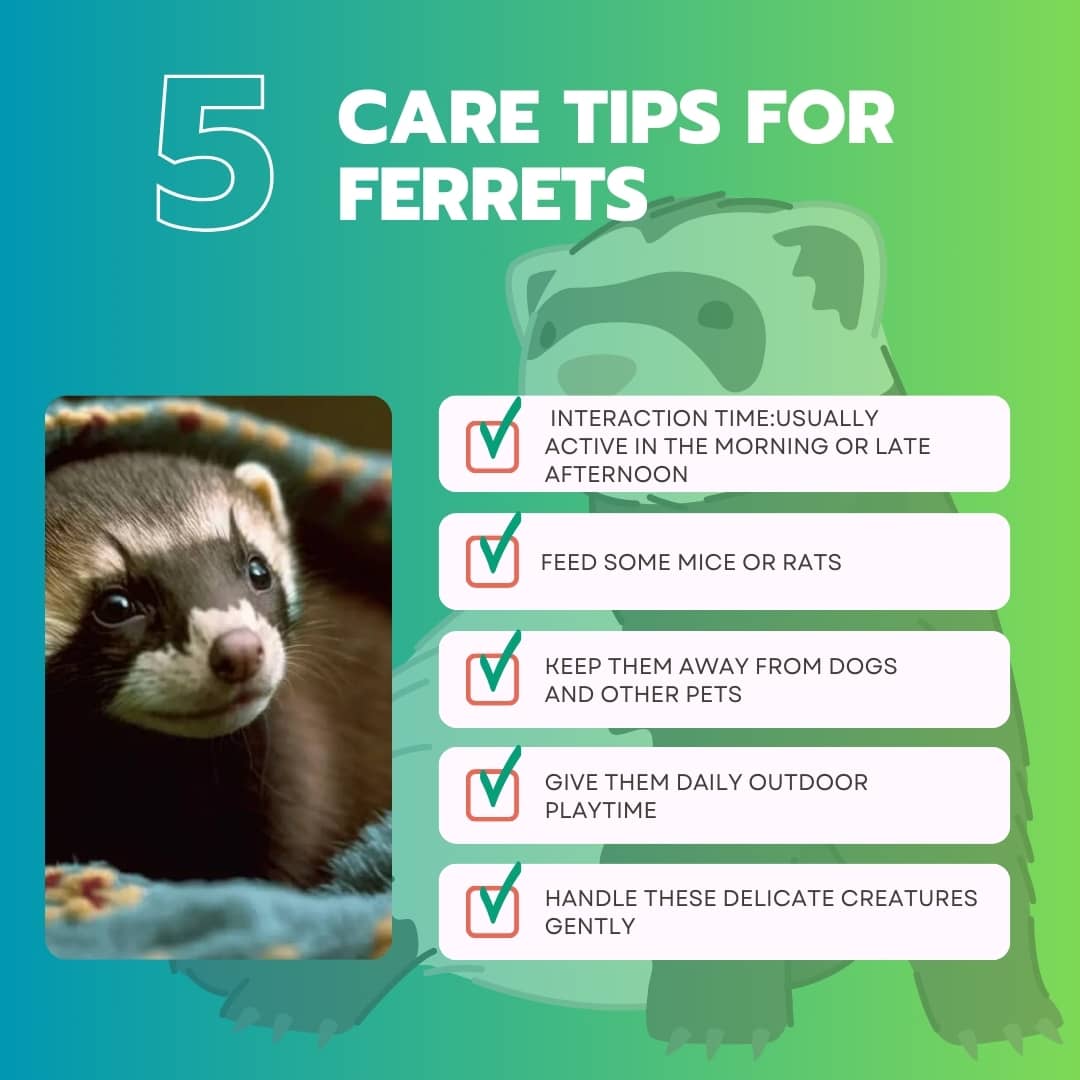Ferrets are small, playful animals that belong to the weasel family, which makes them exotic pets. They are long and slender with short noses, furry ears, and short limbs. Different ferrets have different traits.They come in many colors, including white with pink eyes, sable, cinnamon, white, and chocolate. Though all ferret colors are awesome, white ferrets look very attractive. Male ferrets, called hobs, are usually larger than females, called jills.

Hobs can weigh up to 4 pounds (2 kg), while jills can weigh up to 2.5 pounds (1.2 kg). The average lifespan of a domestic ferret is 6 to 10 years. Ferrets have a neutral musky smell, but regular grooming can help reduce it. They are most active at dawn and dusk.
History, Classification, and Evolution
The original reason for ferrets being domesticated by humans is unknown, as it is for most domestic animals, although it may have included hunting.
The ferret was domesticated from the European polecat (Mustela putorius), according to phylogenetic analysis, and most likely descends from a North African lineage of the breed. Ferrets were domesticated about 2500 years ago, according to mitochondrial DNA analysis.
The ancient Egyptians are said to have been the first to domesticate ferrets, but no mummified remains of a ferret, no hieroglyph of a ferret, and no wild polecats have been found in the region, so that theory seems unlikely.
Classification
Kingdom: Animalia
Phylum: Chordata
Class: Mammalia
Family: Mustelidae
Genus: Mustela
Species: Mustela putorius
Evolution
Ferrets evolved in Europe between 3 and 4 million years ago from weasel-like ancestors. There are only three ferret species on earth. The European polecat, the Siberian polecat, and the black-footed ferret. The black-footed ferret is the only ferret species native to North America.
Behavior and Temperament of Ferrets: Exotic Pets
Ferrets are very social animals. Ferrets sleep for 14–18 hours a day and are most active at dawn and dusk. They are playful and will play with almost anything, including paper bags, cardboard boxes, tubes, and tennis balls.

They enjoy burrowing through their bedding, which can cause them to sneeze. Ferrets wag their tails when they are excited, usually while playing. Ferrets need regular interaction with their human family, too. Spending time playing with and handling your ferret daily helps them feel secure and happy.
Reproduction of Ferrets: Exotic Pets
Ferrets typically breed in the spring. The female ferret, called a jill, can give birth to a litter of 6 to 8 baby ferrets, known as kits. The pregnancy lasts about 42 days. After birth, the kits are blind and helpless, relying on their mother for warmth and nutrition.
They start to open their eyes and grow fur after a few weeks. By 8 weeks old, the kits are usually weaned and ready to eat solid food. Ferrets reach sexual maturity by around 4 to 8 months of age. It’s important to note that Jill can experience health problems if they aren’t spayed, so it’s recommended to have your female ferret fixed if you don’t plan to breed her.
Health and well-being
Ferrets need a proper diet to help prevent lots of common diseases. They’ll also need regular grooming to keep their coat in good condition. If their eating or drinking habits change, ask your vet for advice right away, as it could be a sign that something is wrong.
You should only treat your ferrets with medicine that has been recommended for them by a veterinarian. A medicine that is prescribed for other animals can be very dangerous to ferrets.
- Ensure their nails aren’t getting too long.
- Check your ferrets every day for signs of illness or injury.
- Check the condition of their coat and skin.
Conservation Status
Ferrets are not endangered in general, but certain species, like the black-footed ferret, were once considered extinct in the wild. Due to extensive conservation efforts, including breeding programs and habitat restoration, their numbers have increased, but they are still considered endangered.

Pet ferrets, which are typically domesticated European ferrets, are not at risk and are widely kept as pets. However, it’s crucial to ensure they are not released into the wild, where they could disrupt local ecosystems. Conservation efforts continue to focus on protecting and increasing the population of the endangered ferret species in their natural habitats.
Ferret Adoption
Adopting a ferret can be a great experience, but it needs some planning. Ferrets are playful and love company, so they need a lot of your time and attention.
You can get a ferret from an animal shelter, a rescue group, or a breeder. Before you bring one home, make sure it’s healthy and has its shots. Also, have a cage, food, and toys ready.
Ferrets can be fun pets, but they need daily care, like feeding, brushing, and playing. If you’re for this, adopting a ferret can make you very happy.
Why Do People Choose Ferrets as Pets?
- They are super cute.
- They are entertaining.
- They are playful.
- They are curious.
- They are friendly.
- They Get Along Well With Other Pets
- They are intelligent.
- They are small.
- They are quiet.
How to Care for Ferrets: Exotic Pets
Feeding
Ferrets’ small size means they do not eat much food. It is easy to find ferret food at pet stores, and it is fairly inexpensive. Ferrets need 2-4 small meals a day. Ferrets are carnivores, meaning they need a diet rich in meat. High-quality ferret food that’s rich in protein and fat is best. You can also give them small amounts of cooked meat or eggs as treats. Avoid feeding them fruits, vegetables, or sugary foods, as these can upset their stomach.
Cost
Owning ferrets comes with various costs. The initial cost includes purchasing the ferret, ranging from $100 to $300. Then, there are ongoing costs like food, bedding, and toys, which can add up to around $50 to $100 per month. You’ll also need to budget for veterinary care, including vaccinations and check-ups, which can cost several hundred dollars a year.
Training
Training your ferret can make life easier for both you and your pet. A ferret takes about 1-2 weeks of consistent training. Use a small litter box in their cage and reward them with treats when they use it. Ferrets can also learn simple commands like “come” and “no,” but training should be fun and involve positive reinforcement like treats or praise.
Exercise
Exercise is very important for ferrets. They are active animals and need at least 2-4 hours of playtime outside their cage each day. You can create a safe place in your home where they can run, climb, and explore. Toys like tunnels, balls, and soft chew toys are great for keeping them entertained.
Some Caring Tips for Ferrets: An Exotic Pet
- Ferrets are usually active in the morning or late afternoon.
- Ferrets are carnivorous, and buying some mice or rats from the pet store can satisfy this craving.
- Ferrets are prone to diseases and pests commonly found in dogs and cats, such as viruses and mites.
- When ferrets are brought home from the pet shop. Many have experienced that the animal hasn’t yet been toilet-trained.
- Ferrets love the outdoors, especially in the garden.
- Ferrets are cute and long-furred creatures. The proper way to hold them will be to get the animal from behind with one hand holding the chest while the other is on the hips.

Frequently Asked Questions
Question 1: How to cope with ferret smell?
Answer: Ferrets have a musky odor, but you can manage it by keeping their bedding, litter box, and living area clean. Don’t bathe them too often, as it can make the smell worse.
Question 2: Are ferrets considered pests also?
Answer: Ferrets aren’t pests, but they can be mischievous. They like to explore and can get into small spaces, so it’s important to make sure your home is safe for them.
Question 3: Where can I adopt a ferret?
Answer: You can adopt a ferret from animal shelters, rescue groups, or through breeders.
Question 4: How much exercise do ferrets need?
Answer: Ferrets need at least 2-3 hours of playtime outside their cage every day. They are very active and love to play.
Question 5: Can ferrets get along with other pets?
Answer: Ferrets can get along with cats and dogs if introduced properly, but they should be supervised. They may see smaller animals like birds or rodents as prey.
Question 6: Are ferrets good pets for children?
Answer: Ferrets can be good pets for older children who understand how to handle them gently. they might not be the best choice for very young kids due to their energetic nature.
Question 7: Can ferrets be potty trained?
Answer: Yes, ferrets can be litter trained, though it may take some time and patience.
Conclusion
Ferrets are fun and curious pets that need special care. They are very playful and love to explore, so they can bring a lot of joy to your home. But they also need a lot of attention, the right food, a good place to live, and time to play every day. If you want a ferret, make sure you’re ready to take care of them properly. With the right care, ferrets can be great pets for people who enjoy their energy and curiosity.

